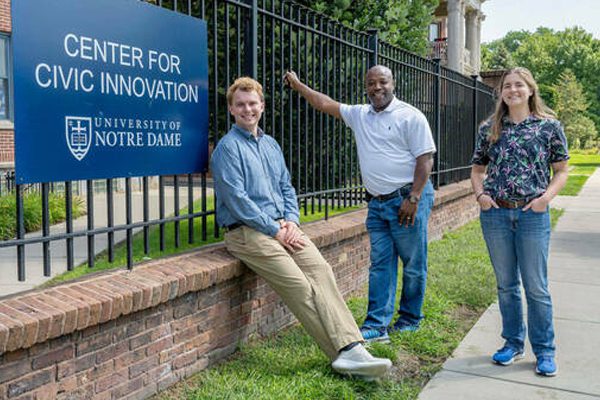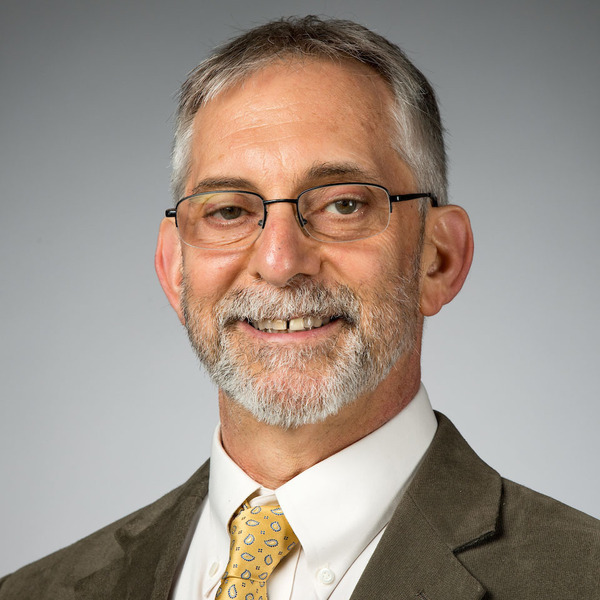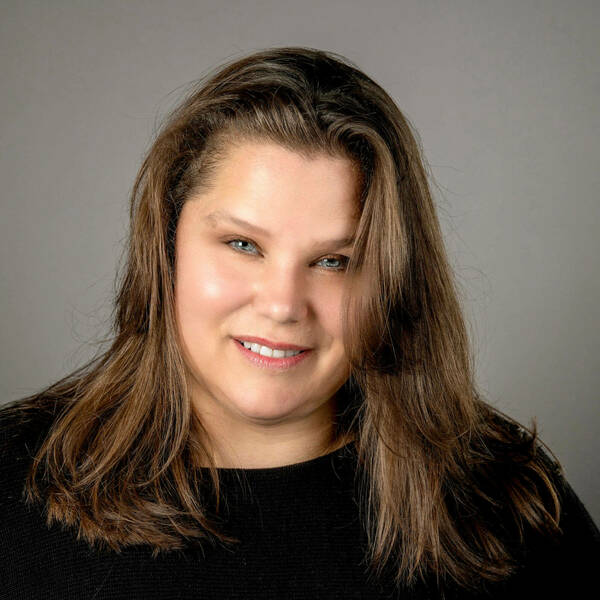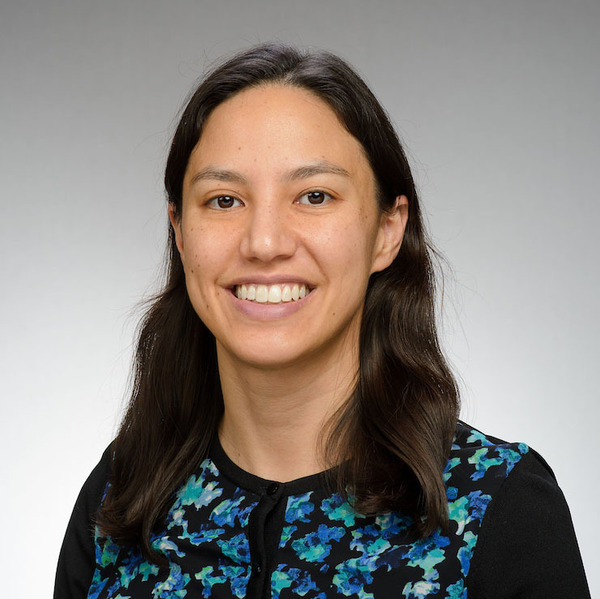For CCI, talent retention spells success for local government, nonprofit employers

When the University of Notre Dame joined with local government, nonprofit and industry partners to form the Bowman Creek Educational Ecosystem, now the Center for Civic Innovation (CCI), the mission was relatively straightforward: engage local leaders and community members to restore Bowman Creek and revitalize the surrounding Southeast Neighborhood in South Bend.
Eight years later, that mission has evolved to include research and education aimed at understanding and solving a variety of pressing civic and industry issues in South Bend as well as Elkhart with support from the National Science Foundation and others.
At the same time, the center, which is part of the College of Engineering, has become a valuable incubator of talent for the local government and nonprofit sectors, further advancing Notre Dame’s mission to be a powerful means for good in the world.
This is particularly true as it relates to the center’s summer internship program, which offers college- and high school-aged students the opportunity to engage with local organizations around issues ranging from food security and housing to sustainability and public health.
The goal: create an effective learning environment that contributes to a strong and diverse STEM workforce in South Bend, Elkhart and other areas of the post-industrial Midwest.
Today, local government and nonprofit organizations employ CCI alumni in a variety of roles, drawn to their breadth of knowledge and experience and desire to engage in meaningful, community-oriented problem-solving.
“(T)hat’s the impact of CCI, realizing you can make a decent living while impacting people. That’s what made it sticky for me.”

To that end, while the center’s primary focus is innovation, “Our biggest product may be our alumni, insomuch as they end up staying here and being community leaders,” Director Jay Brockman, professor of the practice in the College of Engineering, said.
Danielle Wood, associated director for research, agrees.
“The deindustrialized Midwest in particular struggles more than others to attract, develop and retain a skilled workforce,” Wood said. “This is in part why we have gotten an NSF workforce grant — to develop and expand our approach for STEM and workforce skill enhancement while building community and attraction to the region.”
Take Fred Teague.
A native of South Bend, Teague interned with CCI while studying business at Ivy Tech Community College in South Bend.
“I had never heard of (CCI) and, ironically, they were right behind my house,” he said, referring to the center’s original home at LangLab, an arts and business incubator and performance venue in the Southeast Neighborhood, steps from Bowman Creek.
A nontraditional student in his late 40s, Teague was part of a group of interns that collaborated with the city of South Bend to develop a pilot lamppost program. He also helped to create a heat map of areas with deficient street lighting in the Southeast Neighborhood.
As an extern, he later worked with the nonprofit community development organization 466 Works to develop affordable housing in the historically working-class neighborhood, including some of the first new homes to be built there in decades.
This led to a job with the nonprofit Drucker Institute, where he contributed to the development of a lifelong learning platform in collaboration with the St. Joseph County Public Library. He later managed the platform and helped to expand it to Maine.
Today, Teague is the internship program assistant manager at CCI, where he helps oversee eight projects and dozens of interns in South Bend.
He said he would not have pursued nonprofit work if not for his involvement with CCI.
“I wasn’t planning to make it into a career,” he said. “But that’s the impact of CCI, realizing you can make a decent living while impacting people. That’s what made it sticky for me.”
‘A lot of opportunity’
Gemma Stanton, a 2019 Notre Dame graduate in engineering, interned with CCI in 2018, when it was still the Bowman Creek Educational Ecosystem.
A native of Wisconsin, Stanton was part of a group tasked with developing a maintenance and monitoring plan for the creek and adding native plants to a section of the waterway that had become overrun with invasive plants.
“It was neat because it combined the community-oriented process that I really like with engineering and project management,” said Stanton, who heard about the internship program from Gary Gilot, a former director of public works for South Bend who served as director of engineering leadership and community engagement in the College of Engineering from 2013 to 2018.
“I saw a lot of opportunity in South Bend to learn about how to integrate engineering with community-based efforts, learning more technical things and growing as an engineer, but being able to do that in a public service setting.”
As an AmeriCorps member, Stanton worked with a nonprofit in West Virginia after graduation. She later earned a master’s in engineering from University College Dublin as a Naughton Fellow.
Still, she returned to South Bend to start her career.
Today, she is a project engineer with the city of South Bend.
“Based on my experience from college, I saw a lot of opportunity in South Bend to learn about how to integrate engineering with community-based efforts,” Stanton said, “learning more technical things and growing as an engineer, but being able to do that in a public service setting.”
At the same time, she said, “There is a lot of receptivity in (South Bend) to working with data and doing things really efficiently, collecting information and looking at it objectively to arrive at a solution.
“I like that culture about the city,” she said. “I’m sure it exists in other places, but I knew from past experience that South Bend had that kind of environment.”
In addition to Stanton, CCI alumni Finn Cavanaugh and Alicia Pellegrino, fellow Notre Dame graduates in engineering, also worked as project engineers for the city of South Bend, according to Kara Boyles, the city engineer and an adjunct professor of engineering at Notre Dame.
Cavanaugh currently works for Lochmueller Group in South Bend. Pellegrino, meanwhile, is a project manager with the nonprofit Shirley Heinze Land Trust, which works to preserve and restore natural lands in northwest Indiana, including St. Joseph County.
Boyles, who earned her doctorate in engineering from Notre Dame, noted the trio are not from the area, “so I think there’s a strong correlation between their experience with CCI and their desire to stay in South Bend. I believe that to be very true.”
And while Cavanaugh and Pellegrino no longer work for the city, “Finn is still in South Bend and Alicia is just down the road in La Porte,” Boyles said, so they remain close by.

This is unsurprising to Wood, who points to years’ worth of data, collected as part of an NSF workforce development grant, showing a “strongly statistically significant change in attachment” to South Bend and the surrounding area among interns from the beginning to the end of the program.
To be clear, this change is in the positive direction.
Marty Kennedy interned with CCI beginning in high school, when it was still the Bowman Creek Educational Ecosystem, and continuing at Notre Dame, where he majored in sociology and peace studies and minored in data science.
Among other things, Kennedy, who is from South Bend, contributed to a project aimed at optimizing the use of vacant lots in the Southeast Neighborhood and helped run Bowman Creek Academy, a week-long summer program focused on environmental sustainability and youth empowerment.
He later did ad hoc social media work for the center, ending just before the pandemic.
Today, he is a civic innovation fellow with enFocus, a South Bend-based innovation organization with ties to Notre Dame.
“The innovation capacity of the region depends on its ability to retain those with four-year degrees and above, and that’s really at the core of why we do what we do.”
“The innovation capacity of the region depends on its ability to retain those with four-year degrees and above, and that’s really at the core of why we do what we do.”
EnFocus fellows are full-time, salaried employees who commit two years to collaboratively solving problems alongside local organizations and incubating new programs, products and services in the South Bend-Elkhart area, including northern Indiana and southwest Michigan.
Kennedy, for his part, is working on a regional economic development plan for the Niles-Buchanan region in southwest Michigan. He is also working to measure wealth equity in South Bend, with a specific focus on the economically depressed west side compared with other parts of the city, as part of a broader effort to empower more residents financially.
He credits CCI with putting him on the path to enFocus.
“I learned so much about South Bend and what it takes to build community, what it takes to have community input, what it takes to work with neighbors and not at neighbors through the Center for Civic Innovation,” he said.
Kennedy said he sees enFocus as “an extension” of CCI, another step toward improving quality of place and life in the South Bend-Elkhart community “by flexing those nonprofit and government skills in a variety of capacities.”
Common ground
Kennedy is among a number of CCI alumni who have gone on to work with enFocus, which has a track record of talent attraction and retention of its own.
“The innovation capacity of the region depends on its ability to retain those with four-year degrees and above, and that’s really at the core of why we do what we do,” said Andrew Wiand, co-founder and executive director of enFocus.
By its own estimate, enFocus retains about 70 percent of its fellows, which Wiand, a 2011 Notre Dame graduate in biological sciences, attributes to the quality of the fellows combined with enFocus’ innovative approach to problem-solving, which emphasizes relationship-building.
“That’s the stickiness that drives people to stay here,” Wiand said.
As for what makes CCI alumni ideal candidates for enFocus, Wiand cited their well-honed analytical and problem-solving skills, experience working with a team and passion for community-engaged problem-solving.
“Those are the things that we look for in a fellow,” he said, “and they very much align with what CCI has set out to do.”
In fact, it’s not uncommon for enFocus fellows to join CCI later on.

Michelle Sawwan, for example, a research associate with CCI, previously served with enFocus, having graduated from Notre Dame with a master’s degree in sociology and a minor in peace studies. Sawwan is originally from Fairfax, Virginia.
As Wiand explained, “CCI interns may grow into fellows with us, but then to perpetuate that cycle, we have had some fellows hired back into CCI.”
Established in 2018, CCI works with other research centers and individuals across Notre Dame to identify unique opportunities for collaboration that address pressing civic and industry issues in South Bend and Elkhart.
The center is funded, in part, through a pair of workforce development grants from the National Science Foundation, one aimed at replicating the center and its experiential learning model in Ohio and Kentucky with Youngstown State University and the University of Louisville, respectively.
For more information, visit civicinnovation.nd.edu.
This article was written by Erin Blasko, and published on August 18, 2023 by Notre Dame News.
August 18, 2023



